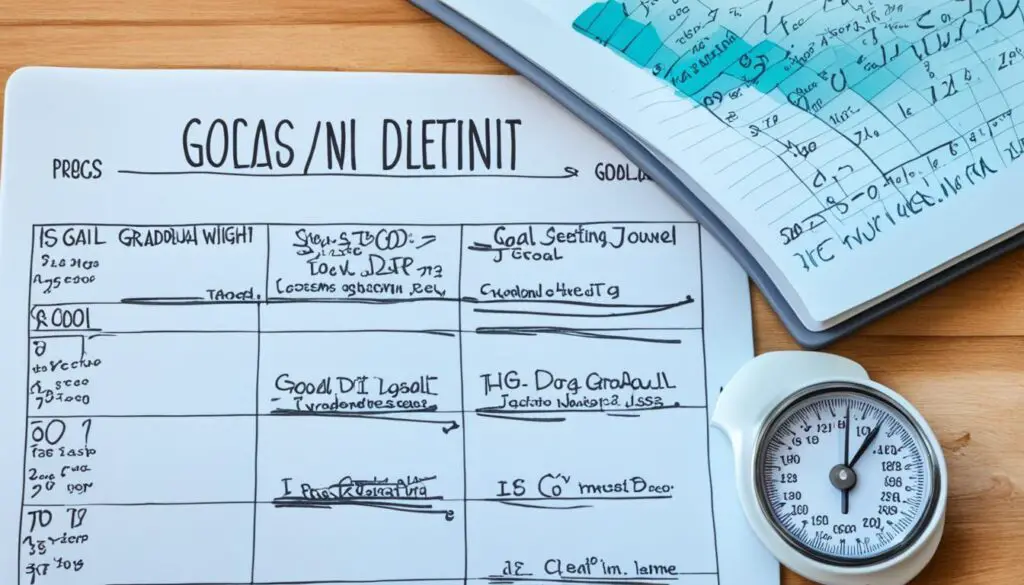Are you considering the controversial HCG diet for rapid weight loss? Before you dive in, it’s important to understand the potential risks, effectiveness, and long-term goals associated with this diet plan. While some claim success with the HCG diet, there are concerns raised by health experts and regulatory bodies.
In this article, I will explore the importance of long-term goal setting for HCG diet success. We will discuss the details of the HCG diet, its potential risks, and effective strategies for achieving and maintaining weight loss. Let’s uncover the truth about the HCG diet and understand the role of goal setting in long-term success.
Key Takeaways:
- Long-term goal setting is crucial for achieving and maintaining success on the HCG diet.
- Consult with healthcare professionals before starting the HCG diet to ensure it is safe for you.
- Focus on realistic goals and sustainable lifestyle changes rather than quick fixes.
- Meal planning and careful food choices are key components of the HCG diet.
- Seek support from healthcare professionals and online communities for accountability and encouragement.
Understanding the HCG Diet
The HCG diet combines the use of manufactured HCG supplements or injections of the HCG hormone with a severe reduction in calorie intake. The diet is divided into three phases: the loading phase, the weight loss phase, and the maintenance phase.
During the weight loss phase, participants consume either 500 or 800 calories per day, spread over two meals. It is important to note that the calorie restriction is significant and should be followed under the guidance of a healthcare provider or registered dietitian.
- The HCG diet restricts certain foods and focuses on lean proteins, specific vegetables, and fruits.
- By altering the body’s hormones, the use of HCG is believed to promote the utilization of stored fat for fuel.
It is crucial to understand the different phases of the HCG diet and how they contribute to weight loss. Let’s take a closer look at each phase:
Loading Phase
The loading phase typically lasts for two days and involves consuming high-calorie foods to build up fat reserves in the body. This phase aims to prepare the body for the subsequent weight loss phase.
Weight Loss Phase
The weight loss phase is the most intense phase of the HCG diet. Participants follow a strict calorie restriction of either 500 or 800 calories per day, depending on the specific plan. Meals are typically limited to lean proteins, specific vegetables, and fruits. The goal during this phase is to maximize fat loss and promote rapid weight reduction.
“During the weight loss phase of the HCG diet, it is important to stick to the designated calorie intake and follow the approved food list to achieve optimal results.” – Dr. Jennifer Thompson, Registered Dietitian
Maintenance Phase
After the weight loss phase, participants enter the maintenance phase, which aims to help them stabilize their weight and establish a new set point. Calorie intake gradually increases during this phase, and participants slowly discontinue supplementation of the HCG hormone. It is essential to continue implementing healthy habits and lifestyle changes during this phase to support long-term weight management.
Understanding how the different phases of the HCG diet work is essential for successful implementation and achieving desired results. However, it is crucial to consult with a healthcare provider or registered dietitian before starting the HCG diet, as this approach may not be suitable or safe for everyone.
| Phase | Duration | Calorie Intake | Main Focus |
|---|---|---|---|
| Loading Phase | 2 days | High-calorie foods | Building up fat reserves |
| Weight Loss Phase | 3-6 weeks | 500-800 calories | Promoting rapid weight loss |
| Maintenance Phase | Ongoing | Gradual calorie increase | Establishing a new weight set point |
Remember, effective goal setting is essential for HCG diet success. Setting realistic goals and following a well-planned strategy can help individuals achieve their desired weight loss outcomes while prioritizing their overall health and well-being.
Safety Concerns of the HCG Diet

The HCG diet is a highly controversial weight loss plan that raises significant safety concerns. Health experts strongly discourage anyone from trying it due to its potential risks and lack of scientific evidence supporting its effectiveness. The FDA has not approved HCG supplements for weight loss, further highlighting the unsafe nature of this diet.
Many proponents claim that the HCG hormone promotes weight loss, but the truth is that most of the weight loss on the HCG diet is a result of severe calorie restriction, not the hormone itself. This extreme calorie deprivation can lead to negative side effects, including hunger, headaches, fatigue, and irritability.
What makes matters worse is that over-the-counter HCG supplements are not regulated or overseen by any governing body, making them potentially unsafe and unreliable. As a result, the safety and efficacy of these supplements cannot be guaranteed.
“The HCG diet is highly unsafe and unhealthy. I strongly discourage anyone from trying it.”
To achieve long-term weight loss success, it is essential to prioritize health and consider evidence-based weight loss options. The HCG diet may offer initial rapid weight loss, but the risks and uncertainties associated with it make it an unwise choice for those seeking sustainable weight management.
In conclusion, when it comes to weight loss, it is crucial to prioritize safety and seek guidance from healthcare professionals. The HCG diet’s safety concerns, lack of FDA approval, and unreliable over-the-counter supplements make it a risky choice for achieving long-term weight loss success. It is important to explore evidence-based alternatives that promote sustainable lifestyle changes and prioritize overall health and well-being.
Setting Realistic Goals for the HCG Diet
When embarking on the HCG diet for long-term weight loss, setting realistic goals is crucial. It is essential to take into account individual health conditions and needs to ensure safety and success. Consulting with a healthcare provider or registered dietitian can provide valuable guidance in determining a safe and appropriate weight loss goal.
Rather than focusing solely on quick fixes, it is important to prioritize sustainable lifestyle changes. Building healthy habits, such as incorporating regular exercise and adopting a balanced nutrition plan, is key to achieving long-term weight management and overall well-being.
By setting realistic goals and gradually implementing healthy habits, individuals can increase their chances of achieving long-term success on the HCG diet. It is worth noting that weight loss is a journey, and it is essential to remain patient and consistent in one’s efforts. Celebrating small milestones along the way can provide motivation and encourage continued progress.
Remember, the HCG diet is not a one-size-fits-all solution, and everyone’s weight loss journey is unique. It is crucial to listen to your body, stay in tune with your hunger and fullness cues, and make adjustments as needed. Prioritizing overall health and well-being should always be the ultimate goal.
Meal Planning and Food Choices on the HCG Diet

Meal planning and making wise food choices are essential for achieving long-term success on the HCG diet. Following the diet’s guidelines and restrictions can help you stay on track and maximize your weight loss results. Here are some tips to help you navigate meal planning and optimize your food choices:
- Include lean proteins: Choose lean meats such as chicken breast, turkey, or fish as your primary protein source. These options are low in fat and calories but provide essential nutrients.
- Focus on approved vegetables: Incorporate non-starchy vegetables like lettuce, spinach, cucumbers, and tomatoes into your meals. These vegetables are low in calories and high in fiber, making them a healthy choice for weight management.
- Enjoy approved fruits: Select fruits such as apples, oranges, and strawberries that are allowed on the HCG diet. These fruits provide natural sugars and essential vitamins and minerals.
- Avoid unauthorized foods: Stay away from dairy products, high-carb foods, fats and oils, and sugary items. These foods can hinder your weight loss progress and may lead to cravings and energy fluctuations.
- Consider the 800-calorie plan: If the 500-calorie version of the HCG diet feels too restrictive, you can opt for the 800-calorie plan. While it may result in slower weight loss, it can provide a more satisfying eating experience.
HCG Diet Meal Planning Example
| Meal | Foods | Calories |
|---|---|---|
| Breakfast | 3 oz grilled chicken breast, 1 cup mixed lettuce, 1/2 cup cucumber slices, 1/2 medium apple | 185 |
| Lunch | 3 oz grilled white fish, 1 cup steamed broccoli, 1/2 medium tomato, 1/2 medium orange | 175 |
| Total | 360 |
Creating a meal plan using approved foods and portion sizes can help you maintain the calorie restrictions while ensuring a balanced diet. Remember to consult with a healthcare provider or registered dietitian for personalized guidance and support throughout your HCG diet journey.
Managing Calorie Intake on the HCG Diet
To maintain long-term results on the HCG diet, it is crucial to manage calorie intake carefully. The 500-calorie version of the diet is considered a very low-calorie diet (VLCD) and should only be followed under the supervision of a healthcare professional.
The timing of meals is not critical, but it is recommended to divide the calories fairly equally between lunch and dinner. This approach helps ensure a balanced and satisfying eating pattern throughout the day. By spreading the calorie intake between two meals, you can maintain energy levels and avoid feeling excessively hungry.
When it comes to beverages, the HCG diet allows coffee, tea, and water. These can be sweetened with stevia or saccharine, providing a bit of variety and flavor without adding unnecessary calories. Staying hydrated is crucial, so it is important to drink plenty of fluids throughout the day.
By carefully managing your calorie intake, dividing it between meals, and choosing appropriate beverages, you can support your long-term success on the HCG diet. Remember to consult with a healthcare professional for guidance and support throughout your journey.
The Role of HCG in the HCG Diet

The HCG hormone is believed to play a crucial role in the HCG diet by altering metabolism and promoting the use of stored fat for energy. *HCG diet goal setting strategies* aim to optimize weight loss by integrating this hormone into the diet plan. However, it is important to note that the effectiveness of HCG in promoting weight loss has not been confirmed through research. In fact, studies have indicated that injections of HCG do not result in greater weight reduction compared to a placebo.
It is crucial to understand that the weight loss achieved on the HCG diet is primarily due to the severe calorie restriction implemented, rather than the effects of the HCG hormone itself. The diet involves consuming a low-calorie intake ranging from 500 to 800 calories per day. This extreme calorie deprivation leads the body to utilize stored fat for energy, resulting in rapid weight loss.
“The weight loss achieved on the HCG diet is primarily due to severe calorie restriction, not the HCG hormone itself.”
Although the role of HCG in the HCG diet is not fully understood, its inclusion in the diet plan is believed to influence metabolism and fat utilization. However, it is important to be aware of the limitations and potential risks associated with relying solely on HCG for weight loss. Additionally, it is essential to consult with a healthcare provider or registered dietitian before embarking on the HCG diet to ensure it aligns with individual health needs and goals.
Maintenance Phase and Long-Term Weight Management

The maintenance phase is a crucial part of the HCG diet to ensure the long-term success of your weight management journey. During this phase, participants gradually discontinue the supplementation of the HCG hormone, while slowly increasing their calorie intake. The objective is to establish a “new weight set point” and maintain a stable metabolism.
Continuing healthy habits is essential for maintaining long-term results on the HCG diet. Regular exercise helps to boost metabolism, burn calories, and preserve lean muscle mass. Incorporating a combination of cardiovascular exercises and strength training can provide optimal results.
Proper nutrition and balanced eating are equally important during the maintenance phase. Strive to consume a variety of nutrient-dense foods, including lean proteins, whole grains, fruits, and vegetables. This will provide essential vitamins, minerals, and fiber to support overall health and weight management.
Remember to prioritize portion control and mindful eating. Pay attention to hunger and fullness cues, eat slowly, and savor each bite. This will help prevent overeating and promote a healthier relationship with food.
The Importance of Setting Realistic Goals
Setting realistic goals is crucial for long-term weight management success on the HCG diet. It’s important to establish achievable targets that align with your body, lifestyle, and overall health. Consult with a healthcare professional or registered dietitian to determine a safe and appropriate weight loss goal.
By setting realistic goals, you can create a more sustainable and manageable weight loss plan. It’s not about achieving drastic overnight changes but rather making gradual improvements that can be maintained in the long run.
“Setting realistic goals is the cornerstone of success on the HCG diet. It’s not a quick fix but a journey towards better health and well-being.”
By approaching the HCG diet with a long-term mindset and focusing on maintaining healthy habits, you can achieve sustainable weight management and enjoy the benefits of improved overall well-being.
Benefits of the Maintenance Phase
The maintenance phase of the HCG diet offers several benefits for long-term weight management:
- Allows the body to adapt to a new weight set point, helping to prevent weight regain.
- Sustains a stable metabolism by gradually reintroducing calories and adjusting eating patterns.
- Promotes the development of sustainable healthy habits, leading to long-term success.
- Offers an opportunity to fine-tune eating behaviors and establish a healthier relationship with food.
During the maintenance phase, it’s important to continue monitoring your progress and make adjustments as needed. Regular check-ins with healthcare professionals or dietitians can provide valuable guidance and support along the way.
| Key Tips for Maintaining Long-Term Results on the HCG Diet |
|---|
| 1. Stay consistent with healthy eating habits and portion control. |
| 2. Engage in regular physical activity to support weight management and overall well-being. |
| 3. Seek support from healthcare professionals or join online communities to stay motivated and accountable. |
| 4. Monitor your progress and make adjustments as needed to maintain a healthy weight. |
By following these tips and staying committed to a healthy lifestyle, you can maintain the long-term results achieved on the HCG diet and continue on your journey towards better health.
Risks and Warnings of the HCG Diet
The HCG diet is associated with numerous risks and warnings that should not be ignored. It is crucial to prioritize health and consider safer, evidence-based weight loss options. Here are some important factors to be aware of:
Potential Nutrient Deficiencies
The severe calorie restriction involved in the HCG diet can lead to nutrient deficiencies. When the body is not receiving adequate calories, it may also miss out on essential vitamins, minerals, and macronutrients. This can have detrimental effects on overall health and wellbeing, compromising long-term weight loss success.
Possible Muscle Loss
Due to the low-calorie nature of the HCG diet, there is a risk of muscle loss. When the body is deprived of sufficient energy from food, it may turn to breaking down muscle tissue for fuel. This can result in a decrease in muscle mass, which can negatively impact metabolism and long-term weight management.
“The HCG diet’s severe calorie restriction can lead to nutrient deficiencies and potential muscle loss, compromising overall health and long-term weight loss success.”
No Oversight of Over-the-Counter HCG Supplements
One major concern with the HCG diet is that over-the-counter HCG supplements are not regulated or overseen by any governing body. This means that the quality, safety, and efficacy of these supplements cannot be guaranteed. It is important to be cautious when considering the use of these products and prioritize evidence-based weight loss strategies.
Illegal and Unhealthy
The HCG diet is not only highly unsafe but also illegal in most places. Health experts strongly discourage anyone from attempting this diet due to its potential risks to physical and emotional health. It is crucial to prioritize health and safety when choosing a weight loss approach.
It is essential to prioritize health and consider safer, evidence-based weight loss options for long-term success. Consult with a healthcare provider or registered dietitian who can provide guidance and support based on your individual needs and goals. Remember, sustainable weight loss is achieved through healthy lifestyle changes, balanced nutrition, regular physical activity, and a focus on overall wellbeing.
Consultation and Support for HCG Diet Success

Before embarking on the HCG diet, it is essential to seek guidance and support from healthcare professionals. Consulting with a healthcare provider or registered dietitian can provide personalized advice and help set effective goals for HCG diet success. These experts have the knowledge and expertise to ensure that the diet is safe and suitable for individual needs. They can also monitor progress and make adjustments as needed to optimize results.
Having a comprehensive understanding of the HCG diet is crucial for long-term success. Healthcare professionals can explain the diet’s principles, potential risks, and limitations, helping individuals make informed decisions. They can address any concerns or questions that may arise and provide ongoing support throughout the process.
Additionally, seeking support from online communities or joining support groups can be beneficial for HCG diet success. Connecting with others who have embarked on the same journey can provide valuable accountability, motivation, and encouragement. It allows individuals to share experiences, exchange tips, and find solace in knowing that they are not alone.
Benefits of Consultation and Support for HCG Diet Success
By consulting with healthcare professionals and seeking support from others, individuals can enhance their chances of achieving long-term success on the HCG diet. Here are some key benefits:
- Personalized Guidance: Healthcare professionals can provide tailored advice, taking into account individual health conditions, goals, and preferences. This ensures a safe and effective approach to the diet.
- Monitoring and Accountability: Regular check-ins with healthcare professionals help track progress and make necessary adjustments. Joining online communities or support groups fosters accountability, as individuals share their progress and setbacks.
- Education and Empowerment: Consulting with healthcare professionals provides a comprehensive understanding of the HCG diet, enabling individuals to make informed decisions. Interacting with others in support groups allows for shared knowledge and empowerment.
- Motivation and Encouragement: Both healthcare professionals and fellow dieters provide motivation, encouragement, and emotional support throughout the HCG diet journey. This can be invaluable during challenging times.
Remember, effective goal setting for HCG diet success involves reaching out for guidance and support. Healthcare professionals and support systems can provide the necessary tools and encouragement to help individuals achieve their long-term goals and maintain a healthy lifestyle.
| Consultation and Support Options | Benefits |
|---|---|
| Healthcare Provider |
|
| Registered Dietitian |
|
| Online Communities |
|
| Support Groups |
|
The Importance of Long-Term Lifestyle Changes
Achieving long-term success on the HCG diet requires more than just following a strict eating plan. It is essential to focus on long-term lifestyle changes that promote overall health and well-being. By incorporating these changes into your daily routine, you can not only achieve your weight loss goals but also maintain them in the long run.
Regular physical activity plays a vital role in achieving long-term success on the HCG diet. Engaging in regular exercise not only aids in weight loss but also helps improve cardiovascular health, boost metabolism, and increase overall strength and endurance. Aim for at least 150 minutes of moderate-intensity aerobic activity or 75 minutes of vigorous-intensity aerobic activity per week, along with strength training exercises twice a week.
Alongside physical activity, balanced nutrition is key to sustaining your weight loss achievements. Incorporate a variety of nutrient-rich foods in your diet, including lean proteins, whole grains, fruits, vegetables, and healthy fats. Ensure adequate fiber intake to promote satiety and maintain digestive health. Avoid excessive consumption of processed foods, sugary beverages, and foods high in saturated and trans fats.
Stress management is often overlooked but is crucial for long-term success on the HCG diet. Stress can lead to emotional eating and sabotage your weight loss efforts. Prioritize stress reduction techniques such as meditation, deep breathing exercises, yoga, or engaging in hobbies that bring you joy. Adequate sleep is also essential for weight management, as lack of sleep can disrupt hunger-regulating hormones and increase cravings.
Building healthy habits and addressing underlying factors contributing to weight gain are essential for achieving sustainable weight management and improved quality of life. Identify triggers that may lead to overeating or unhealthy food choices and find healthier alternatives or coping strategies. Seek support from healthcare professionals, join online communities, or engage in support groups to stay motivated and accountable throughout your weight loss journey.
Conclusion
Long-term goal setting is crucial for achieving and maintaining success on the HCG diet. By setting realistic goals and consulting with healthcare professionals, individuals can embark on a journey towards sustainable weight loss. However, it’s important to prioritize health and consider evidence-based weight loss options, as the HCG diet is highly unsafe, unhealthy, and illegal.
Instead of relying on drastic measures, like the HCG diet, individuals should focus on making long-term lifestyle changes. This includes incorporating regular physical activity, practicing balanced nutrition, managing stress, and prioritizing adequate sleep. By addressing underlying factors contributing to weight gain and building healthy habits, individuals can achieve sustainable weight management and improve their overall quality of life.
When it comes to long-term weight loss success, it’s crucial to prioritize health and consider safe and effective alternatives to the HCG diet. Setting realistic goals, seeking guidance from healthcare professionals, and committing to sustainable lifestyle changes are key elements for achieving and maintaining weight loss success in the long run.
FAQ
What is the HCG diet?
The HCG diet is a controversial weight loss plan that combines illegal HCG supplements or hormone injections with an extremely low-calorie diet.
Is the HCG diet safe and effective?
The HCG diet is highly unsafe, unhealthy, and illegal. Health experts strongly discourage anyone from trying it.
What are the food restrictions on the HCG diet?
The HCG diet restricts certain foods and focuses on lean proteins, specific vegetables, and fruits.
How many calories are allowed on the HCG diet?
The HCG diet allows for either 500 or 800 calories per day, depending on the version of the diet being followed.
Does the HCG hormone promote weight loss?
Research has not confirmed the effectiveness of the HCG hormone in promoting weight loss. The weight loss achieved on the HCG diet is primarily due to severe calorie restriction.
How can I maintain my weight loss on the HCG diet?
The HCG diet includes a maintenance phase after the weight loss phase to help participants maintain their results. It is important to continue healthy habits, such as regular exercise and balanced nutrition.
What are the risks and warnings of the HCG diet?
The HCG diet carries various risks and warnings, including severe calorie restriction, nutrient deficiencies, and lack of oversight for HCG supplements.
Should I consult with a healthcare professional before starting the HCG diet?
Yes, it is crucial to consult with a healthcare provider or registered dietitian before starting the HCG diet for personalized guidance and support.
What lifestyle changes are important for long-term weight management?
Long-term success on the HCG diet and maintaining weight loss require more than just following a strict eating plan. It is essential to focus on long-term lifestyle changes that promote overall health and well-being.
What are some tips for setting realistic goals on the HCG diet?
When setting goals for long-term weight loss on the HCG diet, it is important to be realistic and consider individual health conditions and needs. Consulting with healthcare professionals can help set safe and appropriate weight loss goals.
How can I get support for HCG diet success?
Seeking support from healthcare professionals and joining online communities or support groups can provide valuable accountability and encouragement throughout the HCG diet.




